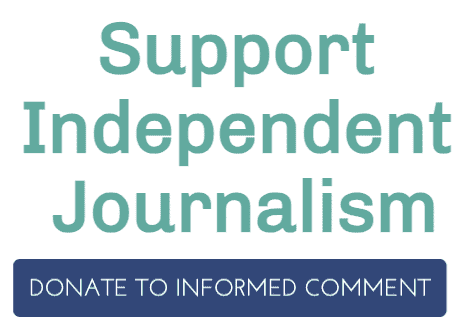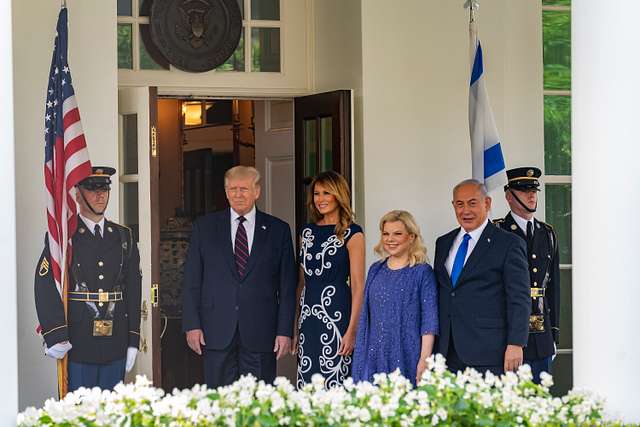Berkeley, Ca. (Special to Informed Comment; Feature) – Today, and particularly in the Middle East, concepts like national interest, class, and geopolitics are fading compared to analysis of political intent, frequently accompanied by accusations of heinous motives (terrorism, genocide). It may be useful to supplement these views with a more cold-eyed analysis of intent, focused on the success and failure of cooperation between new model autocrats in Russia, the US, and Israel.
Post-Cold War, market ideologues had great success in dismantling the limits on economic oligarchies, sparking popular discontent on a global scale. Vladimir Putin found a semi-stable solution that is attractive to aspiring autocrats. In varying degrees, emulation of his model can now be found in countries as disparate as Belarus, Venezuela, Turkey, India, China, the US, Israel, Nicaragua, Saudi Arabia, and Hungary, governing perhaps half the world population.
The model relies on control of the media, engineered elections, dominance of the elite through centralized patronage and severe penalties, and nurturing minor threats into sustainable “existential” enemies. Alongside this emulation, Russia promotes its model abroad using its intelligence services and by weaponizing refugees to besiege its opponents, always aiming to build cooperation among like-thinking regimes under Moscow’s leadership. Whatever its fate in the long run, right now hope that a fraternity of autocrats would be mutually beneficial seems only partially fulfilled.
Cooperation seems to work in the case of budding US autocracy, and helps explain otherwise erratic foreign policy moves. Donald Trump’s favors to Mr. Putin are easy to list. His unreasonable hostility to China drives that country closer to Russia. He attempted to starve Ukraine of weapons in his first administration and again in his second. The first order of business in his second term was to slash US foreign aid, diplomacy, and cultural exchange, effectively crushing American capacity to build good will and gather human intelligence throughout the world – an enormous gift to its competitors.

Or by check:
Juan Cole
P. O. Box 4218,
Ann Arbor, MI 48104-2548
USA
(Remember, make the checks out to “Juan Cole” or they can’t be cashed)
Mr. Putin’s favors to Mr. Trump are also well known but, until recently, of indeterminate weight. There is ample evidence that Russian assets provided by Putin allies saved Mr. Trump from personal bankruptcy decades ago. The Cambridge Analytica and other campaign scandals opened a window into how extensively Moscow involved itself in American politics, with decided emphasis on advantages to Mr. Trump. However, it was hard to measure the influence achieved by the Kremlin until Mr. Trump attempted to free himself from it.
Last July, Mr. Trump simultaneously restarted (and then expanded) weapons delivery to Ukraine, and tried to close further inquiry into the Epstein scandal. Success would have meant defying Mr. Putin and, at the same time, decoupling his own popularity from the QAnon/Epstein phenomenon he has exploited but never seemed to control.
For about a week, the latter goal seemed achievable. Using the most readily available measure of digital attention, Google Trends, the administration’s minimalist announcements on the Epstein matter produced a short-lived increase in public attention peaking at 50 on a scale of 100, quickly dropping to zero despite heavy criticism from Mr. Trump’s most prominent loyalists. In the first week of July, the memo attempting to close the matter drove attention only to 40, suggesting that interest was diminishing. However, when the new weapons for Ukraine were announced the following week, the index showed Epstein searches hit the index maximum of 100, and have remained just under 10 since then.
While there is no certainty that the new magnitude of strife within the US right wing is due to Moscow posting bots, there is no mistaking the speed and vigor with which Mr. Trump resumed action to weaken the US and drive nations closer to Russia. Tariff levels for India hit 50%, pushing Prime Minister Modi into an embrace of Mr. Putin so strong that it included sudden warmth toward China, previously a major opponent. US destruction of a Venezuelan boat shoved South America farther away. As the world watched the North Korean dictator visit with those of Russia and China, Mr. Trump arrested hundreds of South Koreans in the state of Georgia. Topping that, he cut military aid to Baltic NATO countries. And, with humiliating symbolism, Mr. Trump had to stand by while Mr. Putin, speaking on American soil, reminded him that Alaska (implicitly, like Ukraine) had once belonged to Russia.
Although the US is behaving like a Russian satellite country, the Middle East shows that emulation does not guarantee cooperation. Turkey is deeply into the path of Moscow model autocracy, but it also supported rebel forces fighting Russian backed Syria. Those Turkish sponsored forces won their fight, evicting Russia and Iran. For Turkey, geopolitical considerations took precedence over regime companionship.
In Israel, Benjamin Netanyahu has a long, strong friendship with Mr. Putin, overtly tempered by strategic alliance with the US. However, Mr. Netanyahu judges that his own political survival (and avoidance of jail time) requires war that causes increasing damage to Russian allies (bombed in Lebanon, Syria, Iran, and Gaza), and to US influence (in particular, bombing Qatar). In the Israeli case, the imperatives of autocratic practice overruled autocratic cooperation.
Never miss an issue of Informed Comment: Click here to subscribe to our email newsletter! Social media will pretend to let you subscribe but then use algorithms to suppress the postings and show you their ads instead. And please, if you see an essay you like, paste it into an email and share with friends.
This is not to say that cooperation cannot succeed within the region’s complexity. In 2019, Mr. Trump succeeded in rescuing Mr. Putin’s agenda in the Middle East. Iraq had exploded with massive opposition to Iranian influence. The Iranian embassy in Baghdad was burned, Iraqi clerics and militias weighed in with protesters, and demonstrators sacrificed their lives day after day for weeks. Mr. Trump saved Moscow’s position in the region by bombing an Iranian general inside Iraq, instantly shifting Iraqi anger from East to West, exactly as observers at the time had warned in advance.

President Donald J. Trump and First Lady Melania Trump pose for a photo with Israeli Prime Minister Benjamin Netanyahu and his wife Mrs. Sara Netanyahu Tuesday, Sept. 15, 2020, at the West Wing Lobby Entrance of the White House. (Official White House Photo by Joyce N. Boghosian). Public Domain. Via Picryl.
Seen from the perspective of autocratic cooperation, US bombing of Iranian nuclear facilities in June of this year makes sense as an attempt to repeat that sort of maneuver, this time to rescue Mr. Netanyahu – for his sake but also for the sake of both Moscow and Washington. Claiming that Iranian nuclear capacity had been totally destroyed (and suppressing any hint that damage was less than total), Mr. Trump immediately appealed to Israel to drop the legal charges against Mr. Netanyahu, saying it was up to the US to rescue him. If Israeli gratitude had overwhelmed their insistence upon justice and democracy, the Prime Minister would no longer have needed so much bloodshed to perpetuate his control.
Recent events show that even Mr. Netanyahu can be budged. Mr. Trump’s vanity and Mr. Putin’s stop loss imperative aligned to curb their brother autocrat and his antagonists in the Russia-Iran-Hamas chain of proxies.
Again, autocratic cooperation is an additional framework for analysis, not a replacement for other theories. New model autocracy is neither a secret nor a grand conspiracy, but a political agenda spreading unevenly and with problematic success. Its dynamics need to be understood, not least by those who oppose it.


 © 2025 All Rights Reserved
© 2025 All Rights Reserved